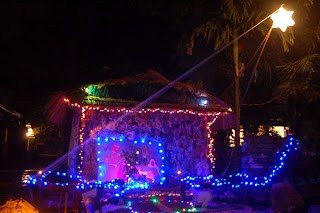Believe it or not you can buy crocs in Dili – probably fake ones, but they’re decent lookalikes. Still, this post is less about footwear and more about the reptilian variety. They are here, my students assure me. It’s easy to imagine there are just off shore, their knobbly dark brown snouts revealed as the waves recede then hidden as the waves flow in again. It’s a game, snout, no snout, snout, no snout, until you realise that what you’ve been viewing as a toothy hazard is, in fact, simply a rock, innocently embedded in the sand.
The crocs, I’m told are mainly at Christo Rei. And why not? It’s touted as having the best beaches in Dili. Why would the crocs want to slum it at some lesser coastal expanse? Additionally all the adults swim at Christo Rei. It’s only the kids that swim at the lesser beaches and not to put too fine a point on it but the adult Timorese make me seem normal-sized so you can imagine their kids are little more than half a mouthful to a ravenous reptile.
Despite this, I have only met one person who claims to have actually seen a croc and, well, I’m not convinced she did, what with all those rocky illusions. Then again, there are those whose claims may carry a little more credibility. A helicopter pilot I met on a walk up a hill claims he’s seen them off Dili Rock. “Not swimming there,” he said, “until April.”
But I swim near Dili Rock, I thought and I haven’t seen any crocs. “They’re there,” he assured me. “I’ve seen them.” Yes, apparently from 6000 feet. Is that possible? I don’t know. What I do know is that the last time I went swimming visibility was itself quite the croc. It happens.
In the rainy season, which we are blessedly in the middle of, we get a daily storm that flushes all the crap from the mountains and probably beyond out onto Dili’s beaches. At the moment there’s a band of brown inshore and then the majestic blue that characterises the dry season. It’s extremely uninviting. There’s not a brown strip out at Dili rock, so I thought it would be fine. It looked fine – on the surface.
Underneath though, the sand was swirling and I’d be periodically hit by anything from a shark to a crocodile to a hoard of marauding giant octopuses – read seaweed, twigs, coconut husks. Nothing harmful – at least not physically. Mentally my nerves were quite shot. Sigh. I haven’t been back since. Damn the croc spotters . . . might not be swimming again until April.


















